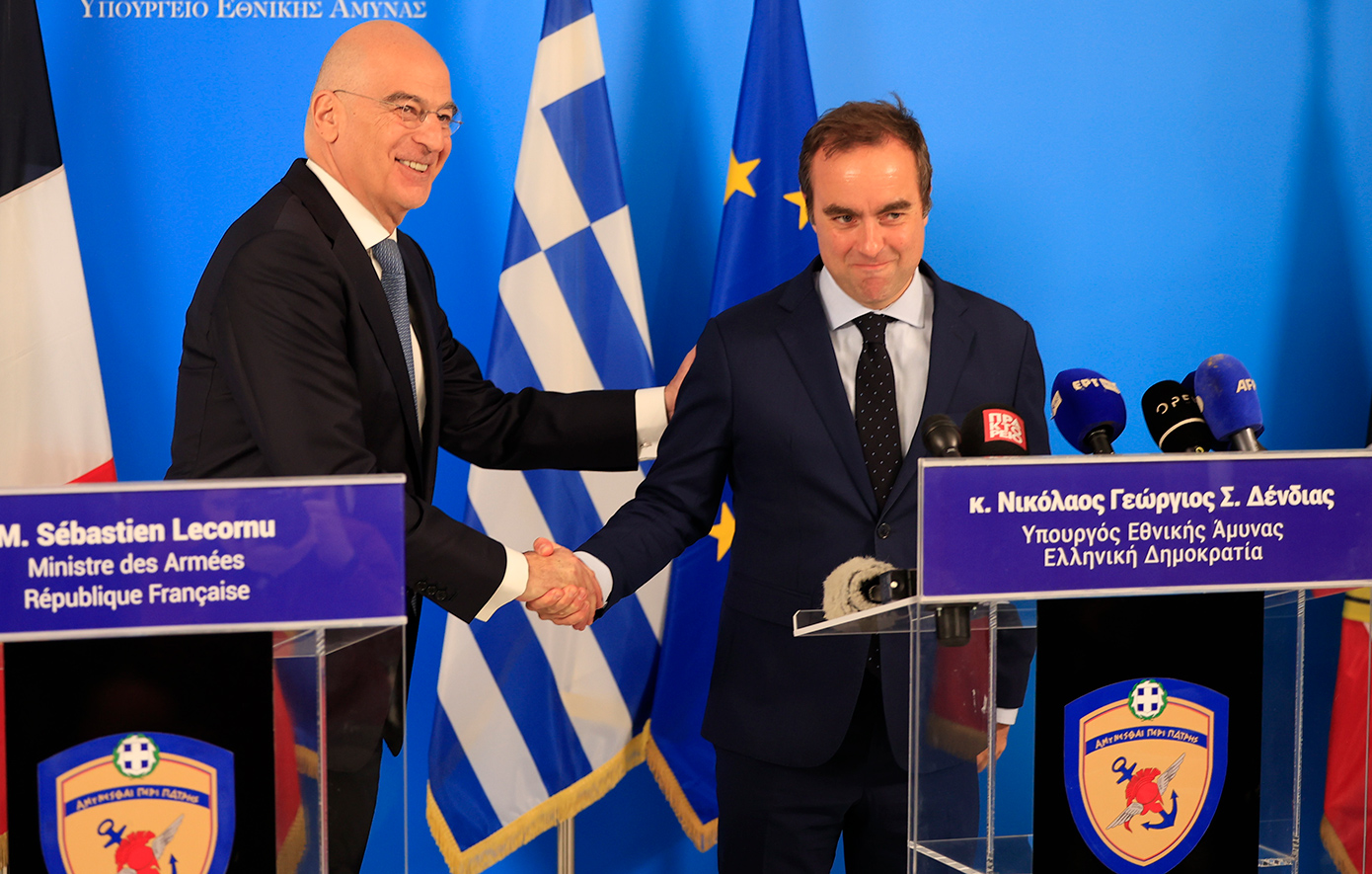Meeting of the Ministry of Finance with his French counterpart Sebastian Lekornos
Further strengthening defense relations and Greece-France strategic cooperation within NATO and the European Union was at the center of today’s meeting of the Minister of National Defense Nikos Dendia and the French counterpart of Sebastian Lekornos at the Ministry of National Defense.
Mr Dendias described the meeting as “fertile and honest in the context of our long -term traditional ties, our common values, shared trust, mutual respect” and added: “We have confirmed the obvious, that Greece and France are close allies and friends, that we are in our own allies and friends.”
Referring to the bilateral national relationship of Greece and France, signed in 2021 on defense and security, Mr Dendias noted that “Article 2 ensures the sovereignty and territorial integrity of both nations as well as our common interests”.
“Greece is always certain that France will take into account its decisions the security of Greece and the need for our country to maintain a comparative technological advantage over the forces of revisionism. Greece does not threaten but is threatenedMr. Dendias clarified, adding that discussions about the renewal of the Greece-France agreement should begin.
‘We already have a close cooperation’ continued, ‘reflected With the acquisition of three Belharra frigates and the discussion of the fourth acquisition, the acquisition of Rafale who with their weapons are key to deterrence and defense in the Aegean and the Eastern Mediterranean. “
He stressed that today, after meeting with his French counterpart, the transnational contract for the supply of 16 Exocet missiles from Greece was signed.
“It has begun,” the Minister of National Defense added, “to create a close cooperation in the field of innovation” while referring to the first Greek-French innovation symposium in defense organized in December 2024 in Athens.
He reiterated that Greece and France are jointly involved in missions and indicated, for example, the “shields”, while for European defense cooperation and industry, he explained that “Greece appreciates France’s contribution to the creation of a common European environment” as part of the reduction of EU dependencies by third parties.
On funding to third parties, Mr Dendias made it clear that “we must limit funding to third parties” referring to “those who act in a doubtful way of strategic interests of our country”.
He also expressed Greece’s views on the Safe Regulation Plan and stressed: “The security issues of all EU Member States must be fully respected. There must be clear eligibility criteria. We believe in both quality and quantitative criterion. “
“Qualitatively,” he added, “the cooperation includes partners sharing the principles and values of the EU and quantitatively fulfill a minimum of compliance with common foreign policy and security policy. I cannot understand how countries with complete divergence from common foreign policy and security policy to participate in Safe. “
He also recognized the efforts of the French Republic to strengthen European defense. “We are completely ready to work with the French Republic on it,” he said.
We also discussed Mr Dendias, a series of issues such as Ukraine, the Eastern Mediterranean, the Aegean, the Middle East and for North Africa, for Sahel.
Mr Dendias also briefed his French counterpart on his recent trip to Lebanon and the Greek government’s decision to strengthen the Lebanese Armed Forces while Mr Dendias underlined “the need to protect all ethnic and religious communities”.
For his part, the French minister thanked Mr Dendia for the warm welcome and said, inter alia, that “the issue of maritime defense is the cornerstone” of Greek-French discussions in the Eastern Mediterranean, the Middle East and North Africa.
“It is the first time in many years since we have seen the sea street knowing such instability and destabilization,” Mr Lekornou explained. “Both Greece and France are two major naval nations,” he added.
He also thanked the way Greece has welcomed “the whole of the French Navy and the Charles de Gaulle aircraft carrier”.
“The need at the political and operational level sets the tone for the industrial part and not the reverse,” Mr Lekornou clarified. We talked, he continued, about the “different abilities we have” and in this context we discussed “Miaras and Rafale” and the whole of the Navy.
He also referred to the cooperation of Greece and France in the Red Sea and made special mention of the weapons given to Ukraine.
For the Electronic War, he stressed that we “saw the needs” and made it clear that there was a “common desire to move on with the fourth frigate (Belharra)”. “We will write a new circle together,” said Mr. Lekornou.
Mr Lekornou also stressed that “under the decisions of Greece” France “will ask Naval Group to complement its presence in our country” and in this context, he added, “a Naval Group subsidiary in Greece could always be created, always in combination and contact with local players.”
He described the stakes as “very important for local work” but also “a very important issue for the integrity and sovereignty of the country but at the same time a point of safeguarding the military leadership, which will have a local reference, a local interlocutor.”
“We will continue,” he made it clear, “to work together in a set of ammunition” and also referred to the deal with MBDA for Exocet missiles, adding that “ships and planes should bring the corresponding equipment”.
“France must also renew its own equipment too,” she said and continued, saying that “there is no final thing right now” assuring that he is working in this direction.
He made it clear that the goal is to increase the ships of the French Navy, and noted that this raises production issues “as the greater demand, the greater the production of equipment and ammunition”.
“We need to see together how this future production will be done and what is the degree of autonomy we want to achieve and therefore in this context our cooperation is the foundation stone,” Mr Lekornou underlined.
